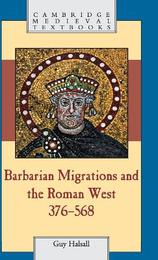
|
Barbarian Migrations and the Roman West, 376-568
Hardback
Main Details
| Title |
Barbarian Migrations and the Roman West, 376-568
|
| Authors and Contributors |
By (author) Guy Halsall
|
| Series | Cambridge Medieval Textbooks |
|---|
| Physical Properties |
| Format:Hardback | | Pages:614 | | Dimensions(mm): Height 218,Width 146 |
|
| Category/Genre | European history
World history - c 500 to C 1500 |
|---|
| ISBN/Barcode |
9780521434911
|
| Classifications | Dewey:937.09 |
|---|
| Audience | | Tertiary Education (US: College) | | Professional & Vocational | |
|---|
| Illustrations |
28 Maps; 1 Line drawings, unspecified
|
|
Publishing Details |
| Publisher |
Cambridge University Press
|
| Imprint |
Cambridge University Press
|
| Publication Date |
20 December 2007 |
| Publication Country |
United Kingdom
|
Description
This is a major survey of the barbarian migrations and their role in the fall of the Roman Empire and the creation of early medieval Europe, one of the key events in European history. Unlike previous studies it integrates historical and archaeological evidence and discusses Britain, Ireland, mainland Europe and North Africa, demonstrating that the Roman Empire and its neighbours were inextricably linked. A narrative account of the turbulent fifth and early sixth centuries is followed by a description of society and politics during the migration period and an analysis of the mechanisms of settlement and the changes of identity. Guy Halsall reveals that the creation and maintenance of kingdoms and empires was impossible without the active involvement of people in the communities of Europe and North Africa. He concludes that, contrary to most opinions, the fall of the Roman Empire produced the barbarian migrations, not vice versa.
Author Biography
GUY HALSALL is Professor of History at the University of York.
Reviews'... the rich and complex work of a meticulous, original, and daring historian, ... Barbarian Migrations and the Roman West should be read by anyone interested the early middle ages, the historical use of archaeological evidence, theories and practices of ethnicity, and finally, in Roman Empire and its ultimate collapse.' Speculum 'This book is important not only as a systematic statement of important current views on how the last Mediterranean empire of antiquity devolved into a series of recognisably European polities, but also for its impressive fusion of seemingly disparate archaeological and literary/historical materials. A genuinely important contribution to its field, by striving to be accessible to those outside its discipline, this book should contribute beneficially to wider discussions of historical change.' English Historical Review
|